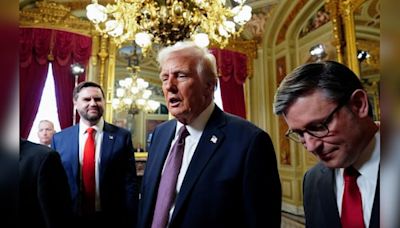The United States has long been known for granting birthright citizenship, a policy that ensures any child born on US soil automatically becomes a citizen, regardless of the parents’ nationality. This practice, enshrined in the 14th Amendment of the US Constitution since 1868, is now under scrutiny following the executive orders signed by President Donald Trump on January 20, 2025.
Trump’s Executive Orders and the End of Birthright Citizenship
Upon taking office, Trump introduced several controversial measures aimed at curbing illegal immigration. Among these, a key policy change sought to end birthright citizenship. Under the new orders, children born in the United States will only be granted citizenship if at least one parent is a US citizen, Green Card holder, or a member of the US military. Children born to undocumented immigrants or foreign nationals without permanent residency would no longer automatically receive US citizenship.
ALSO READ: Kolkata Junior Doctor Rape Case: Sealda Court Sentences Sanjay Roy to Life Imprisonment
Affects on Immigrant Communities
This change, if implemented, would have a far-reaching impact, particularly on the immigrant population in the United States, which comprises approximately 14% of the total population. Among these, the Indian-American community would be significantly affected. As of recent data from the US Citizenship and Immigration Services (USCIS), over 1 million Indian nationals are waiting for Green Cards, with many more aspiring to gain US citizenship.
For Indian students, professionals, and their families, the policy shift could alter long-term immigration plans. Many Indian nationals move to the US for higher education, part-time employment, and job opportunities with the goal of settling there permanently. Under the proposed change, children born in the US to these immigrant families would not automatically acquire citizenship, hindering their future opportunities in the country.
Legal Challenges and Constitutional Hurdles
While Trump’s executive orders signal a drastic shift in US immigration policy, the legal feasibility of ending birthright citizenship remains uncertain. The 14th Amendment has been a cornerstone of American law since 1868, affirming that anyone born in the United States is automatically granted citizenship. In the landmark 1898 Supreme Court case *United States v. Wong Kim Ark, the Court upheld birthright citizenship for children born to non-citizen parents, solidifying the precedent.
ALSO READ:Tiruvuru MLA Kolikapudi Srinivasa Rao Denies Assault Allegations, Clarifies on TDP Inquiry
Experts argue that Trump’s executive orders would require a constitutional amendment to be fully enacted, a complex and lengthy process involving approval by a two-thirds majority in both the House of Representatives and the Senate, as well as ratification by three-fourths of state legislatures. Given these substantial legal obstacles, the orders are unlikely to lead to immediate changes without significant challenges in the courts.
The proposed changes to birthright citizenship, if they withstand legal challenges, would significantly alter the landscape for immigrants in the United States, particularly for those from India. With millions of Green Card applicants waiting for approval, the potential denial of citizenship to their children could have long-term implications. However, the legal hurdles to amending the US Constitution are formidable, and it remains uncertain whether Trump’s executive orders will be implemented in their entirety.






